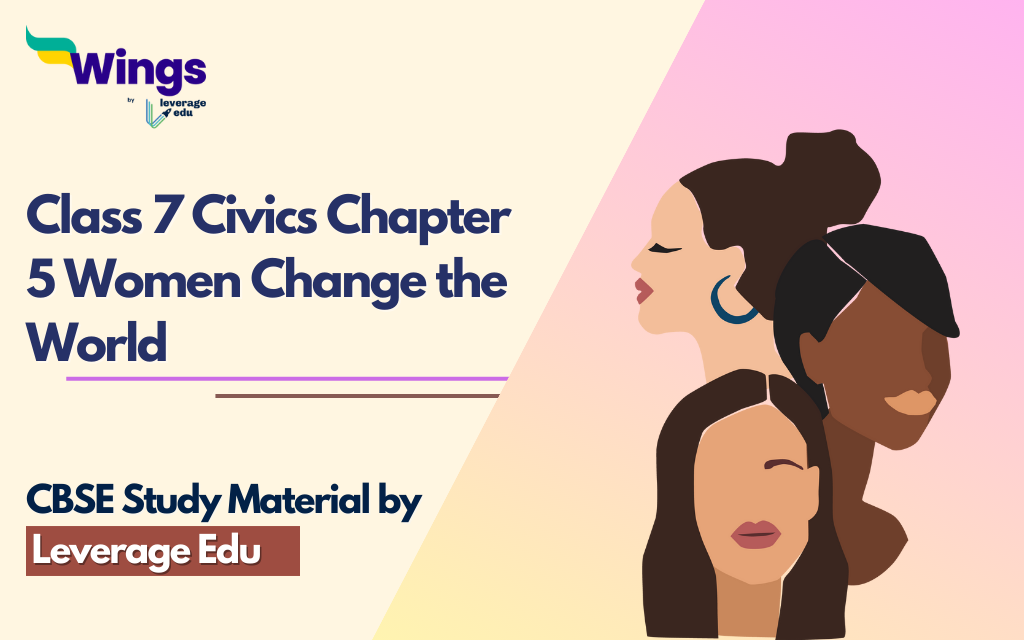In NCERT Class 7 Civics Chapter 5, we will look at work outside the home, and understand how some occupations are seen to be more suitable for men than for women. We will also learn about how women struggle for equality. Getting an education was, and still is, one way in which new opportunities were created for women. This chapter will also briefly trace the different types of efforts made by the women’s movement to challenge discrimination in recent years.
Download Social Science Class 7 Civics Chapter 5 Important Questions and Answers PDF
Explore all the Chapters of Class 7 Civics:-
Contents
You may also want to read Essay on Women’s Empowerment
Women Change the World Class 7 Notes
Let us now look at Class 7 Civics Chapter 5 Notes.
Important Definitions in NCERT Class 7 Civics Chapter 5
- Stereotype: When we believe that people belonging to particular groups based on religion, wealth, or language are bound to have certain fixed characteristics or can only do a certain type of work, we create a stereotype.
- Discrimination: When we do not treat people equally or with respect we are indulging in discrimination. It happens when people or organisations act on their prejudices. Discrimination usually takes place when we treat someone differently or make a distinction.
- Violation: When someone forcefully breaks the law or a rule or openly shows disrespect, we can say that he or she has committed a violation.
- Sexual harassment: This refers to physical or verbal behaviour that is of a sexual nature and against the wishes of a woman.
Sexual Harassment of Women at Workplace (Prevention, Prohibition, and Redressal) Act, was presented in India in 2013. Read this blog- Full Form of PoSH to learn more.
Download Social Science Class 7 Civics Chapter 5 Important Questions and Answers PDF
Explore all the Chapters of Class 7 Civics:-
Important Questions in NCERT Class 7 Civics Chapter 5: Free PDF Download
1. How do you think stereotypes, about what women can or cannot do, affect women’s right to equality?
Ans. Social conditioning has enforced the stereotype that women are considered inferior to men. It is a prevalent belief that women do not have the technical skills needed to be engineers and scientists and that they are only fit for professions like teaching and nursing. This stereotype about which profession they can or cannot pursue plays a major role in the fight for women’s equality. It is also a reason why there is gender inequality in workplaces. Women are generally paid less than men for the same job.
2. List one reason why learning the alphabet was so important to women like Rashsundari Devi, Ramabai and Rokeya.
Ans. It was by learning the alphabet that women like Rashundari Devi, Ramabai and Rokeya were able to write letters, stories and autobiographies, which describe their own struggle against inequality prevalent in society.
3. “Poor girls drop out of school because they are not interested in getting an education.” Re-read the last paragraph on page 62 and explain why this statement is not true.
Ans. Poor girls do not drop out of school out of choice but rather they are forced to leave for various reasons. In rural areas, schools lack basic infrastructure such as buildings, blackboards, stationery, etc. Also, teachers are not available on a regular basis. At times, parents of the girls also feel that it is not important to educate a girl child, as they think a girl’s ultimate goal is to be married and be a homemaker. Thus, they are less willing to spend money on sending their daughters to school.
Don’t Forget to Check Out Previous Chapters Notes Class 7 Civics:
| Chapter 1. On Equality |
| Chapter 2. Role of the Government in Health |
| Chapter 3. How the State Government Works |
| Chapter 4. Growing up as boys and girls |
Explore Notes of All subjects of CBSE Class 7:-
| CBSE NCERT Notes Class 7 English | CBSE NCERT Notes Class 7 History | CBSE NCERT Notes Class 7 Geography |
| CBSE NCERT Notes Class 7 Civics | CBSE NCERT Notes Class 7 Mathematics | CBSE NCERT Notes Class 7 Science |
Explore Class 6 Civics Notes:
FAQs
Discrimination is when we do not treat people equally or with respect we are indulging in discrimination. It happens when people or organisations act on their prejudices. Discrimination usually takes place when we treat someone differently or make a distinction.
When someone forcefully breaks the law or a rule or openly shows disrespect, we can say that he or she has committed a violation.
Sexual Harassment refers to physical or verbal behaviour that is of a sexual nature and against the wishes of a woman.
Follow Leverage Edu for complete study material on CBSE Notes of Class 7 Civics


 One app for all your study abroad needs
One app for all your study abroad needs












 60,000+ students trusted us with their dreams. Take the first step today!
60,000+ students trusted us with their dreams. Take the first step today!